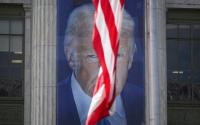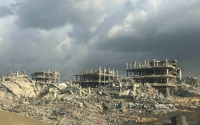22 April 2010Democracy Now!
AMY GOODMAN: We are broadcasting from Tiquipaya, where the World Peoples’ Conference on Climate Change and the Rights of Mother Earth is taking place. We were hoping to speak with President Morales. An emergency came up. And so we’re turning to some of the many thousands of people who have come to this summit. Among them, Boaventura de Sousa Santos, an international respected scholar and one of the leading organizers of the World Social Forum. He’s a professor of sociology at the University of Coimbra in Portugal and a distinguished legal scholar at the University of Wisconsin-Madison.
Democracy Now! producer Sharif Abdel Kouddous caught up with de Sousa Santos here at the conference and asked him for his thoughts on this peoples’ summit here in Bolivia.
SHARIF ABDEL KOUDDOUS: We’re here at the peoples’ climate conference in Cochabamba. What are your thoughts on this conference?
BOAVENTURA DE SOUSA SANTOS: Well, this is really a kind of an alternative to what happened in the plan—the failure of Copenhagen. It was the most undignifying thing that happened in Copenhagen. And it was thanks to the intuition of President Evo that something should be done, because the world was really getting sick and tired of this system, Kyoto system, getting worse and worse. And in fact, it collapsed completely in Copenhagen.
So the idea is to have a summit organized basically by the people and not by the states, even though the states have been very active, some states in this case, the states from the ALBA region here. That is to say, from the states that are trying to develop an alternative here in South America—Bolivia, Ecuador, and also Venezuela and other countries that trying to get together to develop an alternative.
And the alternative is emerging here, with some novelties, which I think the North, the Global North, is going to ignore them for a while. But just for a while, because some novelties are coming up.
And one of—probably the most striking one, in my view, is the Yasuni-ITT [Ishpingo-Tambococha-Tiputini], is this project by Ecuador, according to which Ecuador is ready to leave in the ground most of the crude oil that they have in this huge national park, Yasuni-ITT, where the most—probably the most important site of biodiversity in the world at this point. They are ready to leave it in the ground, provided that the developed countries will compensate Ecuador for the half of they are going to lose for not exploring and exploiting the oil there. And Germany has already agreed to pay 50 million euros per year during thirteen years, which is the period for the exploitation of this project. So this is new. It’s a non-Kyoto, a post-Kyoto type of agreement.
The fidéicommis, which is the legal instrument through the United Nations that is going to make this possible, cannot be signed here, because there were some, you know, complex issues, legal issues of last minute. But President Rafael Correa will be here, and he’s going to show the world and announce to the world that Yasuni-ITT is really to go and is irreversible at this point, even though, as we can imagine, all the oil companies are putting pressure, not just the US, but the European, the Spanish, even the Ecuadorian oil companies, they’re putting pressure in order to kill this project. But the project is irreversible. It’s going ahead. It’s a very strong project. This is just one of the alternatives.
The other one, in my view, is that, for the first time, we are going to—we are having here new words, which are not colonial words. “Buen vivir” comes from “sumak kawsay,” which is a Quechua word. In Aymara it’s “suma qamaña.” It’s a new model, which is beyond socialism, in a sense, and capitalism, as well, because it’s a new form of care for life, of community life, that comes from the original people of this continent that, in fact, have been excluded by all the Western modernity, but kept alive their lifestyles. And their lifestyles now, they show the world some signs of the future. They are not a part of the past; they are part of the future. It is no coincidence that 70 percent of the biodiversity of the world is located in the indigenous peoples’ territories. That is to say, they have been the guardians of biodiversity through this concept of a new lifestyle of Adam and Eve with the Mother Earth, as they call it. And the Mother Earth has some rights, the rights of the Pachamama, as they call them.
This is new, cannot be expressed in English or in Spanish or Portuguese or French in adequate terms, because they come from non-colonial language. And the Global North is going to hear about this. This is new. They are going to ignore it, you know, as long as they can. But I don’t think this is an historical—I think this is an historical trend, and sooner or later, they will acknowledge there are different ways of seeing the future, in non-developmental ways, not in quantitative ways, but other ways of caring for life, human life and all the life on the planet.
SHARIF ABDEL KOUDDOUS: And you’ve been very active in the World Social Forum.
BOAVENTURA DE SOUSA SANTOS: Mm-hmm.
SHARIF ABDEL KOUDDOUS: How would you relate social movements in the past to what’s happening here in Cochabamba?
BOAVENTURA DE SOUSA SANTOS: Well, I think this summit cannot be explained without the Social Forum, because, in a sense—the World Social Forum, because, in a sense, the movements that we see here are movements that became very active—well, they were active, actually, before, but they were not united. They didn’t—for instance, in the first World Social Forum, we met—we had several indigenous movements that lived sixty kilometers apart in the Amazonian region and didn’t know each other. They have been there for thousands years, but they didn’t know each other. So now they knew each other, and they started organizing, articulating struggles and so on. They are now with several federations of indigenous peoples’ movements, both in—they’re called the lowlands, which are the Amazonian regions, and the Andean regions. Two very big organizations. Well, this wouldn’t be possible. All the things that we accomplished during the past decade were absolutely crucial to understand what is going on today. Yeah, that’s right.
SHARIF ABDEL KOUDDOUS: And you’ve studied a lot of the Amazonia. What are some of the problems that are plaguing the Amazon jungle?
BOAVENTURA DE SOUSA SANTOS: Well, precisely, the problems are that—the most important one is the creation of an infrastructure, a kind of regional infrastructure that is trying to develop, you know, not just highways, but also transform the rivers into highways for the extraction of the mineral products, of the soybeans and all the, you know, the monocultural type of development and this extractivist type of mining and oil and so on. This is a model that is going to destroy the lifestyles of the Amazonian region.
For instance, the project that is now being discussed that goes from the Manta region that you know very well, because it was the American US base in Manta that is not anymore, because Ecuador has not renewed the base, in the Pacifica and—in the Pacific Ocean and then Manaus, leading to Belem near the Atlantic Ocean. They want to develop this without consulting the indigenous peoples, destroying the lifestyles and all the life on earth that exists there, all the biodiversity. These are the kinds of conflicts that are taking place in the Amazonian region at this point.
And as you can imagine, the indigenous people, they are not homogeneous. And capitalism is very strong. And they manage to divide the indigenous people sometimes, and some of the indigenous people seem to agree with this development. They don’t really see all the dangers that are there. They are promised land. They are promised money, basically, and very good money, actually. But, in fact, most of them are really waging these two—these two values, territory on one side, money on the other. With money, they can’t do much; with the territories, their life and their dignity and their memories and their belonging and nationalities, that is at stake. And therefore, most of them are choosing the territory, not the money. But this is a struggle, of course.
SHARIF ABDEL KOUDDOUS: And finally, there’s been criticism from some quarters that while this conference is to be applauded, to be held by Evo Morales, that nothing will come of it. What is your response to that?
BOAVENTURA DE SOUSA SANTOS: Well, you know, you never know. I mean, nothing that is being planned—I mean, probably, we don’t know what will come out. I mean, I think that Hegel was very right when he talked about the cunning of reason. So you never know how the reason of these meetings is going to develop, to unfold into initiatives.
What I think is that what—the heads of states that are going to be here have now a mandate, and it’s very clear, a mandate that in fact the buen vivir, the Pachamama, the rights of Mother Earth are seriously to be taken care in our discussions, in our debates. And this is the mandate. And they are going to take this mandate to the next meeting in Mexico and to the following meetings. We don’t know. But we want to show that the public opinion is divided. You have 15,000 people, most of them young people, I mean, people that really believe that there is an alternative and there should be an alternative, and they are ready to struggle for an alternative. I mean, that’s what we can hope for. This is not a revolution, of course, in the old style, but it’s the way the world is changing in a more progressive way, and it’s taking place here.
AMY GOODMAN: Boaventura de Sousa Santos, internationally respected scholar, one of the leading organizers of the World Social Forum, a professor both at the University in Coimbra in Portugal and at the University of Wisconsin-Madison. He’s here at the World [Peoples’ Conference on Climate Change and Rights of Mother Earth] that is taking place in Tiquipaya, just outside Cochabamba, Bolivia.






